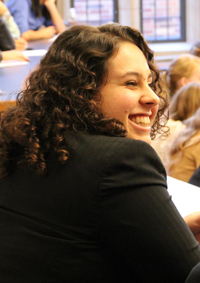On Saturday, the New York Times published a stunning essay by Rosemary Mahoney, a teacher at a school for the blind, entitled "Why Do We Fear the Blind?" She opens with a quandary seemingly absurd on its face, but one that we unsighted people know all too well:
A few years ago, when I mentioned to a woman I met at a party that I was teaching in a school for the blind, she seemed confused. "Can I just ask you one question?" she said. "How do you talk to your students?"
I explained that the students were blind, not deaf. Raising the palms of her hands at me, as if to stem further misunderstanding, she said: "Yes, I know they're not deaf. But what I really mean is, how do you actually talk to them?"
I once read that, according to one survey, Americans report feeling more afraid of blindness than they are of diabetes, cancer, or heart disease. Cancer! Heart disease? They've got to be kidding me. Blindness is not a life-threatening disease — for many, not even a condition significant enough to stunt personal success. Yet sight is so essential to the concept of living that people feel some sort of an existential attachment to it, as if to lose their sight would be akin to losing life, altogether.

This attitude, which pervades even the most learned of circles, strips blind people of a level of basic humanity. Friends have told me that, before they met me, they wouldn't have known how to communicate with a real blind person, as though there exists some separate language or code of conduct governing our interactions. Some people — the people with whom I typically don't become friends — handle our first interaction by either 1) growing unusually laconic, 2) articulating their words unnecessarily slowly, or 3) lowering their voices as if by a loved one's sickbed.
Even on the streets of Yale's campus, where I supposedly rub shoulders daily with future Nobel-winning scientists and U.S. senators, I am confronted with a basic lack of understanding. Strangers always shout at me — some even grab an arm or the scruff of my shirt — to ensure that I know a curb is coming up when I am poised to cross a street. Friends frequently ask me, without really thinking, if I know where I'm going when I'm headed home. Though I am a fellow student who theoretically gained admission under the same application standards, other students frequently do not think to extend my credentials into the non-academic realm.
The basic problem with blindness, I've come to believe, is simply one of relatability. It is so difficult to describe. Plug your ears, and you hear nothing. But close your eyes and you see the insides of your eyelids, the light shining through your lashes, the wild Technicolor of your imagination flashing before you. Whenever I tell someone that "I really don't see at all — just like you don't hear anything at all when you cover your ears," they always seem bamboozled, as if I've lost my mind because the sensation I am describing sounds physically impossible.
I do not profess to know a particularly effective strategy of dealing with such prejudice; on the one hand, it's easy to feel frustrated by awkward interactions or excessive offers of help. But I can also understand from where the prejudice is stemming. Over the course of my admittedly short life, whenever I've met a person who could not hear or walk, some irrational fear I hadn't even been aware of harboring suddenly shattered.
For me, the best solution has been simple exposure. The more my name appears in the school paper — the more people recognize me as the girl they saw at last night's party or the girl who's always ensconced at the corner table in the dining hall, jabbering about politics, the less they can strip me of my humanity. So effective is this method, in fact, that I use it as an offensive tactic whenever prejudice strikes. If someone says something like, "Hey, do you need help to wherever you're going," I'll respond in a way that conveys just how much I have my wits about me. "No thanks, I'm headed to the newspaper building just around the corner that way," I'll say, with a hand gesture for effect.
Typically, that does the trick.
I'd love to hear your stories — both about the strangest forms of prejudice you've seen as well as ways you've developed to deal with them. Leave your stories in the comments below or tweet me @MHackman with the hashtag #AFBBlog.